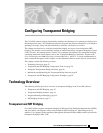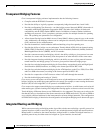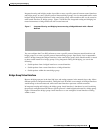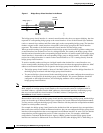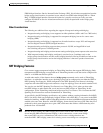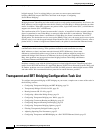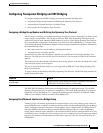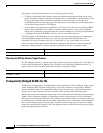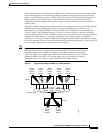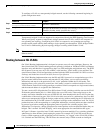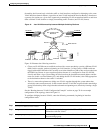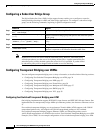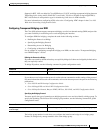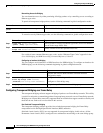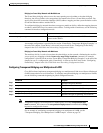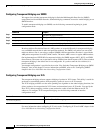
BC-23
Cisco IOS Bridging and IBM Networking Configuration Guide
Configuring Transparent Bridging
The Cisco IOS software bridging functionality combines the advantages of a spanning-tree bridge and a
full multiprotocol router. This combination provides the speed and protocol transparency of an adaptive
spanning-tree bridge, along with the functionality, reliability, and security of a router.
This chapter describes how to configure transparent bridging and source-route transparent (SRT)
bridging. This chapter also describes the concepts of virtual networking, transparent bridging of virtual
LANs (VLANs), and routing between VLANs. For a complete description of the transparent bridging
commands mentioned in this chapter, refer to the “Transparent Bridging Commands” chapter in the
Cisco IOS Bridging and IBM Networking Command Reference, Volume I. To locate documentation of
other commands that appear in this chapter, use the command reference master index or search online.
This chapter contains the following sections:
• Technology Overview, page 23
• Transparent and SRT Bridging Configuration Task List, page 28
• Tuning the Transparently Bridged Network, page 60
• Monitoring and Maintaining the Transparent Bridge Network, page 62
• Transparent and SRT Bridging Configuration Examples, page 62
Technology Overview
The following sections provide an overview of transparent bridging in the Cisco IOS software:
• Transparent and SRT Bridging, page 23
• Transparent Bridging Features, page 24
• Integrated Routing and Bridging, page 24
• SRT Bridging Features, page 27
Transparent and SRT Bridging
Cisco IOS software supports transparent bridging for Ethernet, Fiber Distributed Data Interface (FDDI),
and serial media, and supports source-route transparent (SRT) bridging for Token Ring media. In
addition, Cisco supports all the mandatory Management Information Base (MIB) variables specified for
transparent bridging in RFC 1286.



